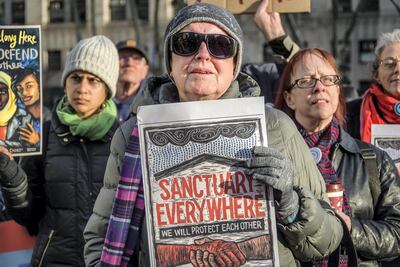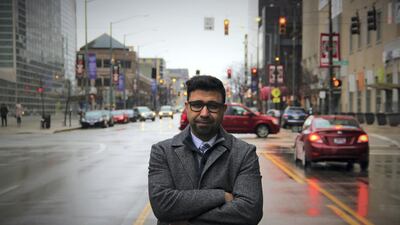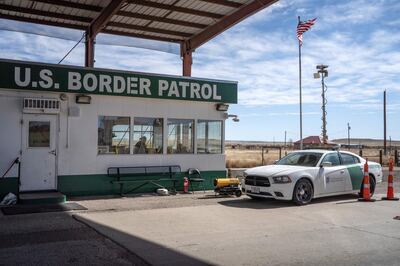Mohamed Al Hamdani was 8 years old when he, his mother and four siblings fled their home in Samawah in southern Iraq. Al Hamdani’s father had been part of the ultimately doomed 1991 uprising against Saddam Hussein’s regime and was thought to have been killed during a five-day battle in the city. “I remember F-16s bombing our city, our neighbours dying around us, the Iraqi army coming through our city,” he recalls.
One night, word was brought to his mother that Al Hamdani's father was alive, and had made it to a refugee camp across the border in north-eastern Saudi Arabia. "My mother left the house keys with a neighbour. We thought we'd be home soon."
The family was reunited at the camp, but the fallout of the regime's repression was significant. About 1.8 million Iraqis had fled and for many there would be no going home. There, Al Hamdani's family went without certainty for the future for almost two years before their refugee applications for the US were granted and they could move on with their lives.
Almost 30 years later, Al Hamdani sits in his gleaming new office on the 16th floor of Liberty Tower in central Dayton, Ohio. He's an immigration lawyer who helps refugee clients and is recognised as one of the most influential young leaders in the city. This month, he was elected president of the board of a local school district that oversees about 13,000 pupils. "I think coming to Dayton was one of the best things to happen to our family," he says with a broad smile. "I grew up thinking 'I can be anything'."
For decades, the US has been the world's leading safe haven for refugees, giving people such as Al Hamdani a shot at a successful life out of reach back in their home countries. Over the years, America has provided refuge to more stricken people than all other countries put together. While many countries around the world continue to provide temporary asylum to millions of refugees, certain nations provide a permanent home and route to citizenship. The US has offered this to three million refugees since 1980, more than the rest of the world combined, according to the Pew Research Centre. That year, the cap on how many people were allowed to resettle in the US was set at as high as 231,000 people. Since 2000, the average annual figure has stood between 70,000 and 80,000, while during the height of humanitarian disasters in Syria and Myanmar, president Barack Obama's administration set the cap at 110,000.
All that changed when Donald Trump entered office in January 2017. In the years since, the number of admitted refugees has fallen dramatically. The ceiling for admissions in 2020 has been set at 18,000 – the lowest figure since the US Refugee Act was introduced four decades ago. What's more, recent reports show several new countries are to be added to the so-called Trump Travel Ban that currently forbids citizens from six Muslim-majority countries and several others from entering the country. This includes Nigeria, Eritrea, Sudan and Myanmar, whose citizens will be blocked from obtaining certain types of visas.

About 4,000 of this year's places will be taken by Iraqis who have worked with US soldiers, 5,000 will be issued to people fleeing religious persecution and 1,500 places will be held for Central American migrants. Initially, the White House, heavily influenced by hawkish senior Trump adviser Stephen Miller, wanted to admit no refugees this year.
In an election year and with populism a constant spectre on the political map, appealing to conservative Americans is a central facet of Trump's re-election strategy. His right-wing backers point out that between the fiscal years ending in 2016 and 2019, the number of refugees from Syria fell from 12,587 to 563, Iraq from 9,880 to 465 and Somalia from 9,020 to 231.
"Taken together, admissions from these 11 designated high-risk nations have fallen by 95 per cent," reported the Migration Policy Institute in September. That's despite the fact that in regions such as the Midwest, refugees are playing a crucial role in revitalising communities and derelict districts by buying residential and business properties previously left empty from outward migration. In Dayton, a city hollowed out by decades of post-industrial economic decline, a growing community of Ahiska Turk families, a Turkish-ethnicity minority from south-west Georgia, have helped restore blight-filled streets north of the city centre, and opened several trucking companies and restaurants. Lebanese, Ethiopian and other world food restaurants receive monthly acclaim at 'Ethnosh' gatherings organised by community leaders. More than 400 immigrants from 40 countries take English classes at a language school every year.
In the past decade, Dayton, population 140,000 people, has received 3,000 refugees directly through the resettlement process. Today, about 90 per cent of refugees designated to Dayton come from east and central Africa, rather than Muslim-majority countries. "It's pretty much ended," says Michael Murphy, programme manager for refugee resettlement at the Catholic Social Services of the Miami Valley. "Once the travel ban started, we were no longer receiving folks not only from the Middle East, but anybody who came from a state that had a strong Muslim identity."

To further controversy, in September, Trump issued an executive order allowing US cities and towns the ability to veto the resettlement of refugees inside their jurisdiction. The law, a first of its kind, is set to spark lengthy and bitter legal battles between mostly liberal cities within states governed by conservatives across America.
In Texas, the largest recipient of refugees in the country, it already has. Last month Republican governor Greg Abbott announced the Lone Star state would become the first to refuse to accept refugees. The move infuriated resettlement organisations and religious leaders in Texan cities, such as Austin, where about one fifth of the population is foreign-born.
“Texas has been left by Congress to deal with disproportionate migration issues resulting from a broken federal immigration system,” Abbott explained. “The state and non-profit organisations have a responsibility to dedicate available resources to those who are already here.”
In Springfield, Massachusetts, Democrat Domenic J Sarno, the son of Italian immigrants and the longest-serving mayor of the city, one of the poorest in the state, also issued his veto. "You cannot continue to concentrate poverty on top of poverty," he wrote in The Republican newspaper, adding that more affluent communities should "step up to the plate" and "take on their fair share of social justice responsibilities".
On the other hand, Al Hamdani's home state of Ohio has notified the Trump administration that it intends to continue welcoming refugees. Its Republican governor, Mike DeWine, informed the state department that Ohio "has a long and successful history of welcoming and assimilating refugees from all corners of the globe". More than 40 state governors have chosen to follow DeWine's lead. In Utah – a largely rural state of about three million people, where Democrat Hillary Clinton was outvoted by Trump by almost two to one in the 2016 presidential election, and whose governor is also a Republican – politicians have reiterated their demand to host refugees in light of Trump's move. The reason for this, however, is not always particularly altruistic.
States such as North Dakota, booming as a result of massive oil and gas shale-fracking discoveries, are facing vast job surpluses and are in desperate need of workers to fuel their economies. This prairie state has 30,000 more jobs than workers. "I have 33 businesses that say they will take as many refugees as they could," Fargo mayor Tim Mahoney told the Associated Press in December. Yet Mahoney agrees with Trump's decision to allow states and cities to decide if they want to resettle refugees. "It's a good move and allows for more control," he said.
Across the Midwest, state governments have unveiled streamlined visa programmes for highly qualified immigrants from India, China and elsewhere to meet the demand for medical and computer specialists. In the Great Lakes region, the spending power of immigrants was valued at $130 billion (Dh477.42bn) in 2015. There, only 29.2 per cent of the US-born population aged 25 and above holds at least a bachelor's degree, while 35.2 per cent of immigrants have that level of education, found a study by the New American Economy Research Fund. "And the foreign-born population has become even more educated in recent years."
As tens of thousands of people are left to deal with persecution around the world, thousands more working in refugee assistance fields inside the US may find their jobs at risk as a result of federal funding cuts. For those who do manage to make it to US soil via the southern border, asylum and refugee-seekers inside the country continue to be held in atrocious conditions, says Al Hamdani. "I was recently in Louisiana to help a gentleman who was Ahiska Turk," he says of a man who entered from Mexico. There, the authorities "put close to 700 people in a jail converted to a detention centre. There were 70 men in a small room."
Activists, however, haven't given up the fight. On Wednesday, January 15, a preliminary injunction blocking Trump's executive order allowing states to block refugee resettlement was issued by a federal judge in a lawsuit brought forward by three faith-based groups. "It's hard to say how long the injunction will be in effect," says Bill Swersey of HIAS, a refugee advocacy group in Washington, DC, one of the plaintiffs. "The government could appeal and try to have it thrown out. They could also just write a new executive order to try to get around our challenges." He says a date for a trial has not been set.
For Al Hamdani, he is disappointed by what he says are nonsensical politics and policies coming out of the White House, as refugees have a lot to offer the US. “We come from places where opportunity is rare,” he says. “So when we come to a country and it’s giving you opportunities, we’re going to take advantage of those opportunities and live the American dream.”


